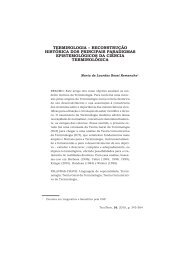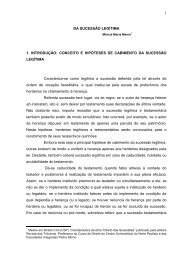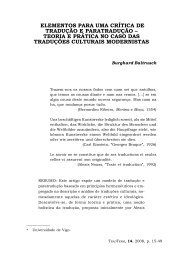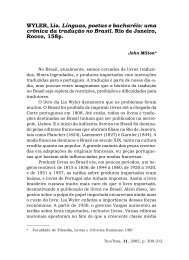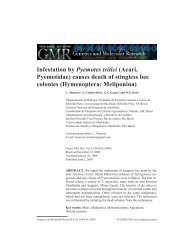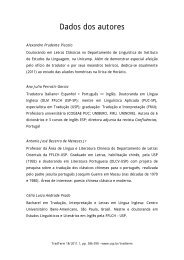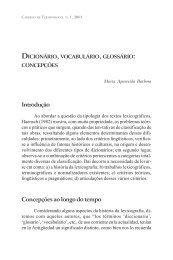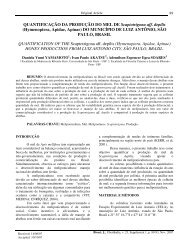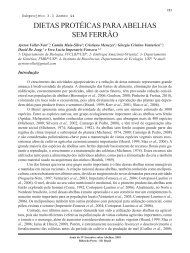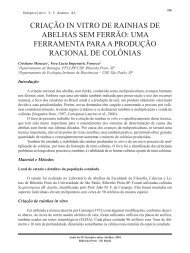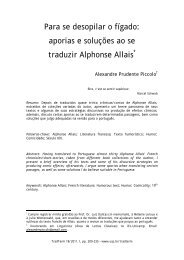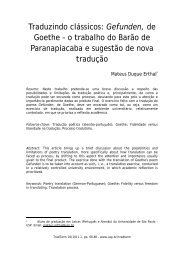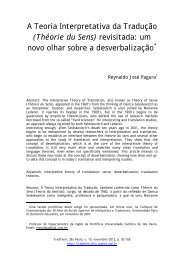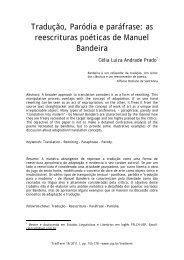Bees as pollinators in Brazil - USP
Bees as pollinators in Brazil - USP
Bees as pollinators in Brazil - USP
Create successful ePaper yourself
Turn your PDF publications into a flip-book with our unique Google optimized e-Paper software.
94<br />
They unanimously stressed the advantages<br />
and importance of the use of IT tools and techniques<br />
to help achieve the goals of the<br />
International Poll<strong>in</strong>ators Initiative and of the<br />
national/regional PIs. The project Conservation<br />
and Management of Poll<strong>in</strong>ators for Susta<strong>in</strong>able<br />
Agriculture Through an Ecosystem Approach,<br />
under the auspices of FAO and GEF, will require<br />
an <strong>in</strong>tensive use of IT on the development of its<br />
four components. The prelim<strong>in</strong>ary ph<strong>as</strong>e of the<br />
project, the PDF-B ph<strong>as</strong>e, will provide an<br />
opportunity to review, identify and analyze<br />
gaps on the technology regard<strong>in</strong>g its application<br />
to the PIs. The full-size project that will<br />
subsequently be developed may accommodate<br />
part of that development.<br />
Accord<strong>in</strong>g to what w<strong>as</strong> presented, software<br />
tools seem to be the most widely used<br />
components. Websites for various purposes<br />
were reported for all PIs though their content<br />
and complexity differed significantly. In some<br />
c<strong>as</strong>es, simple webpages are used to convey<br />
project <strong>in</strong>formation, educational <strong>in</strong>formation,<br />
etc. Despite that simplicity, their effectiveness<br />
is acknowledged and they fulfill some b<strong>as</strong>ic<br />
needs of the developers and users.<br />
At a higher level, there are the datab<strong>as</strong>es<br />
that can be accessed via Internet. Specimen<br />
<strong>in</strong>formation from biological collections at<br />
museums, for <strong>in</strong>stance, is be<strong>in</strong>g digitized and is<br />
<strong>in</strong>cre<strong>as</strong><strong>in</strong>gly available on-l<strong>in</strong>e. Though the percentage<br />
of the specimens of the known world’s<br />
collections that is already available on-l<strong>in</strong>e is<br />
small, that number is <strong>in</strong>cre<strong>as</strong><strong>in</strong>g consistently<br />
and some <strong>in</strong>ternational and global efforts <strong>in</strong><br />
that direction were mentioned. It w<strong>as</strong> stressed<br />
the need to jo<strong>in</strong> and to strengthen that digitization<br />
effort, which faces many difficulties<br />
related to fund<strong>in</strong>g and data ownership.<br />
This br<strong>in</strong>gs up the problem of the <strong>in</strong>tegration<br />
of all that data. Such <strong>in</strong>tegration is important<br />
for many different purposes, such <strong>as</strong> for<br />
build<strong>in</strong>g a global catalogue of life on Earth (such<br />
<strong>as</strong> the Catalogue of Life, from Species 2000 and<br />
ITIS ), and for creat<strong>in</strong>g checklists of species and<br />
resolv<strong>in</strong>g nam<strong>in</strong>g problems. Further use of <strong>in</strong>tegrated<br />
data is made by analysis software, such<br />
<strong>as</strong> that for model<strong>in</strong>g species distribution, ext<strong>in</strong>ction<br />
risk, and protection strategies. Analyses<br />
tools are of utmost importance <strong>as</strong> they can be<br />
used to guide the development of environmental<br />
public policies on a more solid foundation.<br />
This <strong>in</strong>tegration requires the use of standards<br />
and protocols for data exchange. These<br />
standards are under development with the<br />
support of <strong>in</strong>stitutions such <strong>as</strong> GBIF, TDWG,<br />
among others, with the participation of<br />
groups from many countries. This is another<br />
area that needs more support, <strong>as</strong> it is essential<br />
to allow more seamless access to and share of<br />
biological data. It w<strong>as</strong> suggested that FAO and<br />
GEF should participate of that effort. An example<br />
of the use of those standards to <strong>in</strong>tegrate<br />
different sources via <strong>in</strong>ternet w<strong>as</strong> presented at<br />
the SpeciesL<strong>in</strong>k project .<br />
As the use of such <strong>in</strong>formation <strong>in</strong>cre<strong>as</strong>es<br />
<strong>in</strong> its complexity, more tools are necessary to<br />
allow automation of many of the bor<strong>in</strong>g and<br />
repetitive t<strong>as</strong>ks.<br />
An important part of the remote access to<br />
data is related to bibliography. An on–l<strong>in</strong>e peerreviewed<br />
journal on <strong>poll<strong>in</strong>ators</strong> and poll<strong>in</strong>ation<br />
is be<strong>in</strong>g designed with<strong>in</strong> the BPI, and it w<strong>as</strong><br />
suggested that this journal should be supported<br />
with<strong>in</strong> the FAO/GEF project. Such a journal<br />
would both facilitate <strong>in</strong>formation exchange<br />
and encourage research and publications on<br />
<strong>poll<strong>in</strong>ators</strong>, especially <strong>in</strong> the develop<strong>in</strong>g countries.<br />
Much research on <strong>poll<strong>in</strong>ators</strong> and poll<strong>in</strong>ation<br />
<strong>in</strong> develop<strong>in</strong>g h<strong>as</strong> been traditionally done<br />
<strong>in</strong> a haphazard manner, and often the results<br />
are not readily accessible. A specific journal on<br />
<strong>poll<strong>in</strong>ators</strong> would both provide means to guide<br />
and improve such research, through examples<br />
and through peer review, and would also facilitate<br />
publication of such <strong>in</strong>formation.



